It’s that time of the year again when I reveal the results of our annual Installers’ Choice Awards for Best Solar Panels in 2024. With insights from installers across Australia, I asked them three crucial questions to discover which solar panels they rate as the best in the business for 2024:
- What brand of solar panels would you buy for your own home if money was no object?
- What about if you were on a budget, and every dollar counted?
- What brand has the best after-sales support?
So, let’s uncover which brands have outshone the competition in the eyes of those who know them best – the installers.
Best Value Solar Panels In Australia: 2024
In the highly competitive “Every dollar counts” category, we look for panels offering the best bang for your buck without compromising on quality. This year’s winners have proven exceptional performance and affordability can indeed go hand in hand:
Best Value 2024: Third Place – Canadian Solar
Canadian Solar returns to the podium with 9% of the vote. Known for their efficient and reliable HiHero panels boasting up to 22.8% efficiency, Canadian Solar continues to impress with a solid combination of performance and affordability.
Best Value 2024: Second Place – Jinko Solar
Holding firm in second place for the fourth consecutive year is Jinko, capturing 24% of the vote. Their Tiger NEO panels, with an efficiency of up to 22.6%, underline Jinko’s commitment to providing top-tier, budget-friendly panels.
Best Value 2024: First Place – Trina Solar
Dominating the category for the fourth year running, Trina Solar secures the top spot with 27% of the vote. Their Vertex S+ panels, with up to 22.5% efficiency, demonstrate Trina’s unwavering ability to deliver value for money without skimping on quality.
Best Solar Panels In Australia: 2024
For those where cost is not a barrier, and only the best will do, this category showcases high-end solar panel technology. Here are this year’s winners:
Best Solar Panels 2024: Third Place – Trina Solar
Trina Solar proves they’re not just a champion of affordability, taking bronze with 14% of the vote in the prestigious “Money’s no object” category, demonstrating their versatility and broad appeal from budget to high-end solar installs.
Best Solar Panels 2024: Second Place – Sunpower
Sunpower secures the silver for the second year, with 21% of the vote. Their Maxeon series panels, with efficiencies up to 22.8% and a staggering 40-year product warranty, embody top-of-the-range solar technology.
Best Solar Panels 2024: First Place – REC
REC retains gold with an impressive 45% of the vote, thanks to their superior quality and performance at a more accessible price point than Sunpower. The Alpha Pure range stands out for its efficiency and durability.
I’ve got 14 kilowatts of REC panels on my roof, and I’m delighted with them:
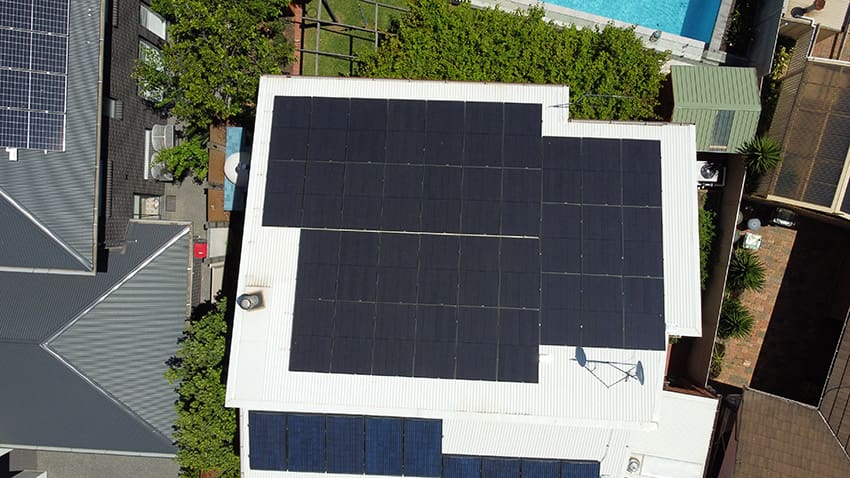
Yes, Finn paid market rates for the REC panels – no kickbacks here.
Congratulations to REC for winning Gold two years in a row.
Best After-Sales Support: 2024
In an era where long-term reliability is paramount, this category honours the brands backing their products with exceptional support:
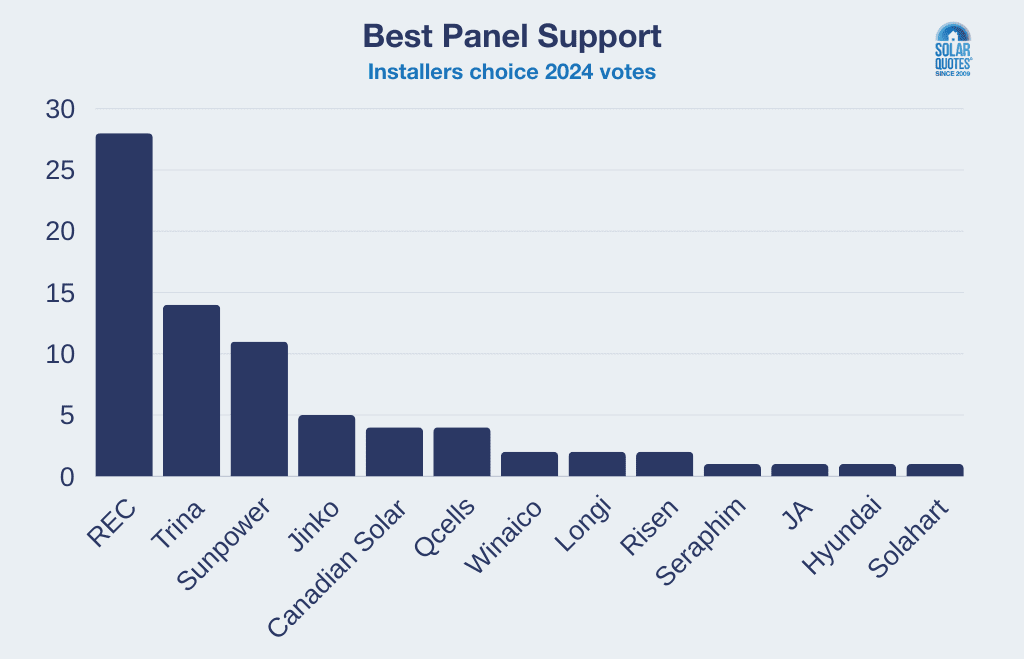
Best support
Wrapping up
So there you have it: REC wins Best Panels and Best Support, while Trina wins Best Value Panels.
For those keen on the finer details of these top-tier solar panels, head to our solar panel comparison table for an in-depth look at the specs. And if you’re ready to take the next step towards solar, batteries, or EV chargers, simply enter your postcode here, fill in the form, and let me connect you with trusted installers ready to bring the benefits of solar into your home.
Congratulations to this year’s winners. They are the best solar panels in Australia, as voted by Australian solar installers.

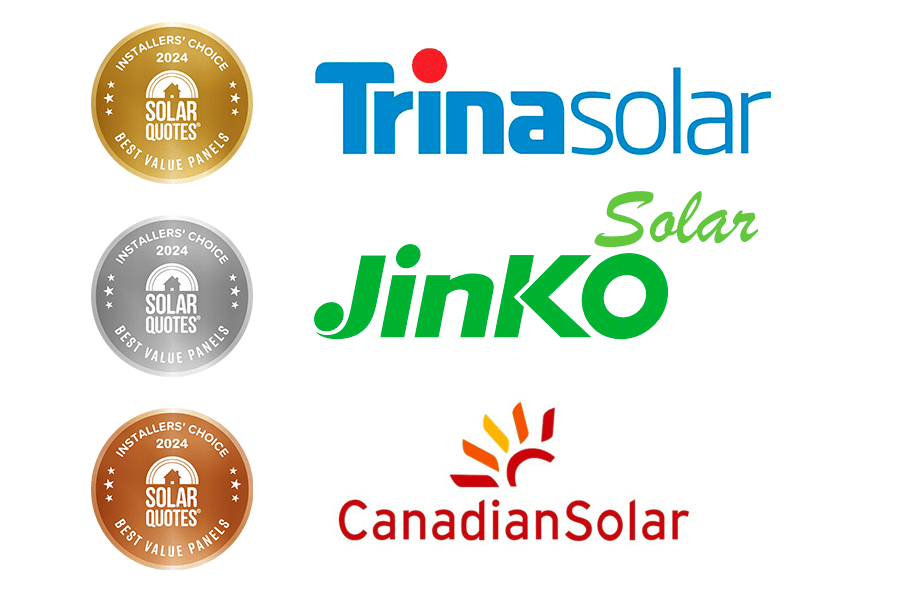
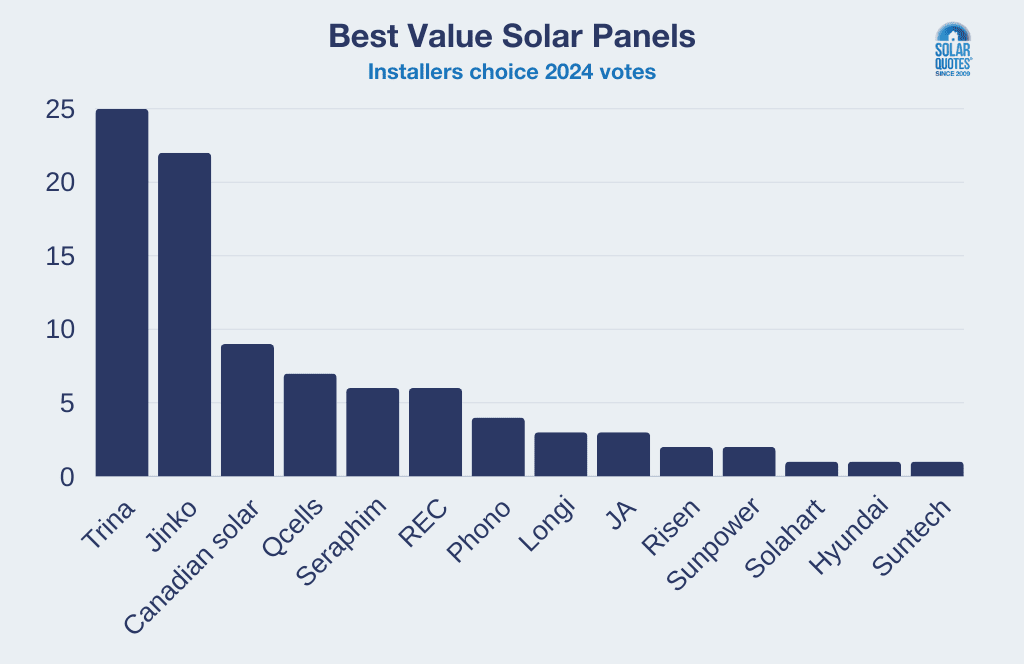
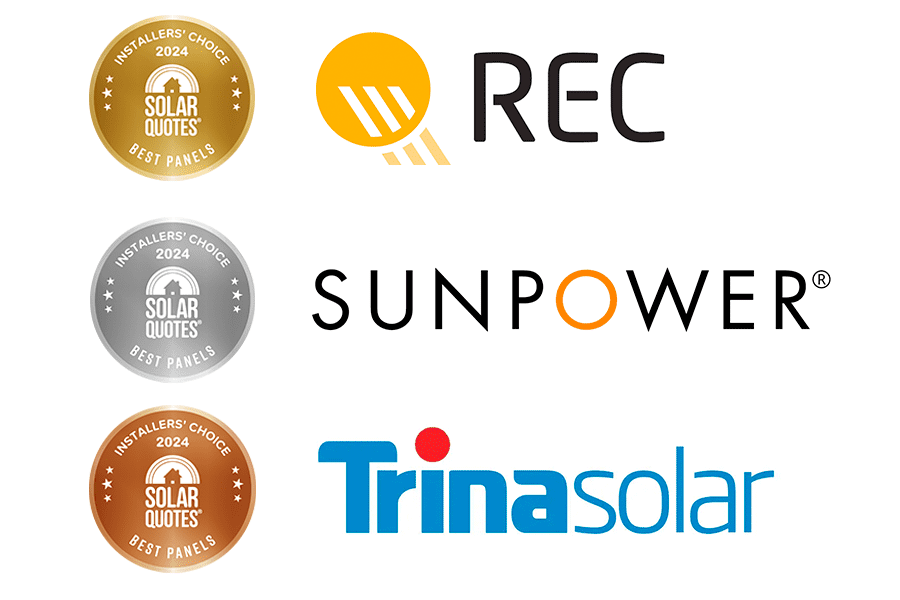
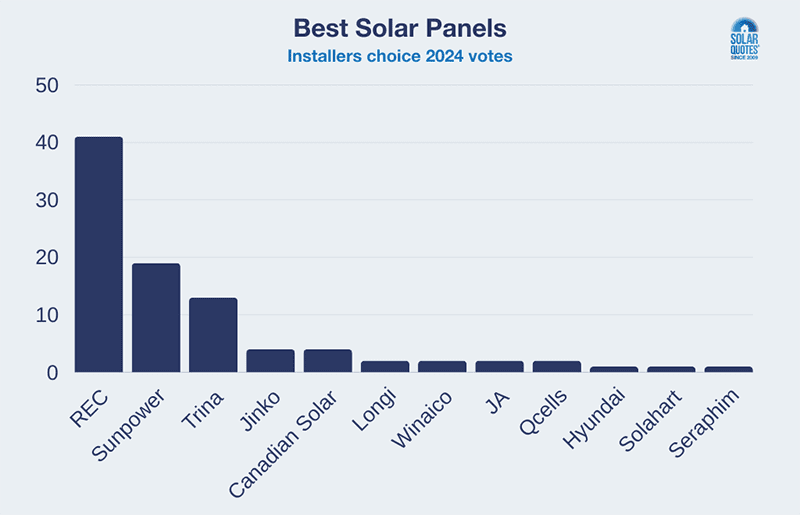
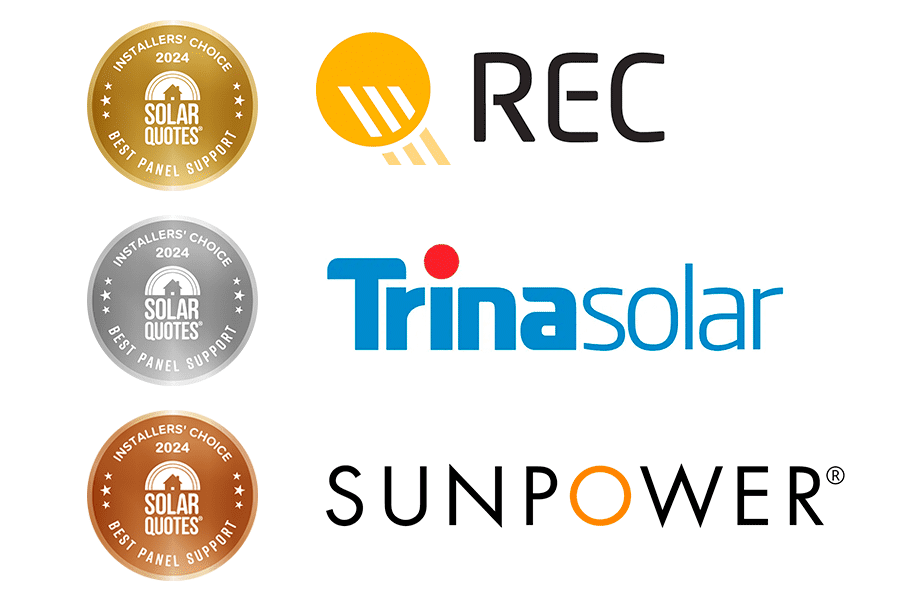
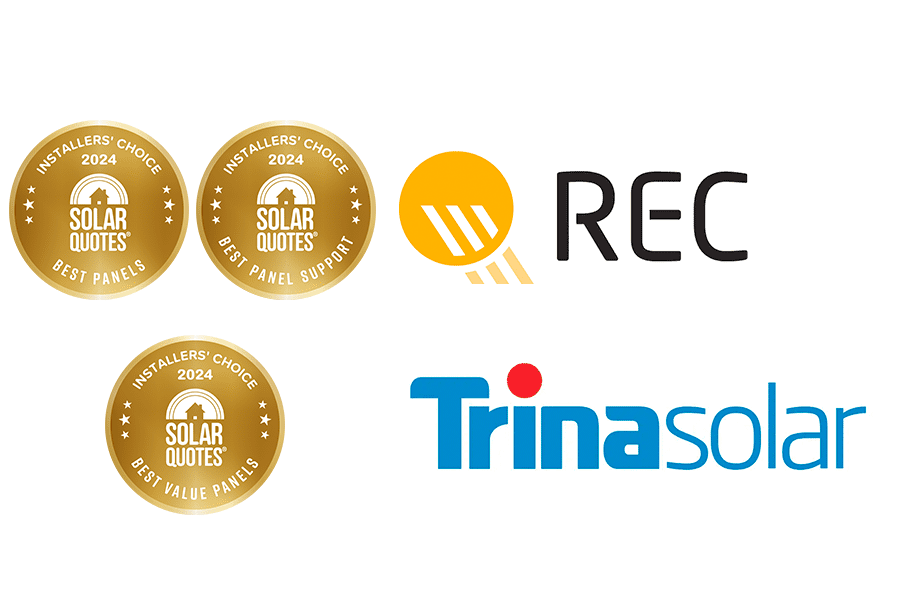
 RSS - Posts
RSS - Posts



And Trina won places despite the horror warranty stories exposed by this site’s own blog?
The installers vote based on their experience; we have no input. The examples of poor warranty service seem rare enough to not override installers’ good experiences with Trina in Australia.
Any chance of having a reliability and efficiency study of panels after say two or five years? Problem with installers opinions is they don’t actually see them working and have information about reliability.
These are installers who also sell the systems – and thus are responsible for the 25 year plus warranties. They won’t sell panels that they don’t trust or know to be reliable over decades.
But how often do the people who sell and install the panels come back to check on their efficiency and physical longevity?
A poll of about a dozen others who I know with solar panels is that they never come back or ring to see how well the system runs. Or come back to see how the panels and electrical plumbing survived the last storm.
Which are questions just as relevant as how the system looks and screws together when it’s installed.
The real test of a system is how it maintains its electricity outout and its physical integrity after 10 years out in the weather.
Maybe a poll of blog followers with these questions in mind would be informative.
The 27 kW of REC Alpha Pure 420W panels which went up here last month were chosen almost exclusively because they are lead free. Here, miles off-grid, it’s tank water or thirst, so best not to take chances. It’s bad enough to have a bit of gumleaf taint in two of the tanks, but they can be used for garden watering and fire fighting. Only the latter could tolerate lead pollution. Even city folk, using tank water for a vegetable garden, might give it a thought.
Finn’s “Fill the Roof” policy is well advised. Even the 23 kW of shadow free arrays currently being insolated yield only 2.3 kW in bright 100% overcast at the moment. But the batteries and EV are full, so it’s going into the HWS. Adequately overdimensioned, there’s enough production for modest consumption on low sun days.
Yeah, battery for 5 days is good. Array oversize of 300% or more, for indefinite maintenance of base load in overcast, is even better. Both is proving very comfortable – so far.
We’ve doubtless not seen the last high voltage power pylons flattened like soggy noodles. The famous physicist Svante Arrhenius, in a paper published in 1896, predicted +5 degC global heating for +50% atmospheric CO2. And 425/280 ppm is +52% to date. So +1.77 degC in February is just thermal lag due to 93% of heating going into the oceans. I’ve heard of 30 Mt of Greenland icemelt per hour – that’s about 5 cubic km per week, if I’m counting right on my fingers.
If not off-grid, then being on a local microgrid with ample battery capacity seems advisable in the coming decades. There is then much less need to spend billions upgrading the network to push rooftop energy back up a pipe not built for that. And when it goes down, there’s less problem with no network power for 5 weeks, like in the Dandenongs in Jun-Jul 2021. (Yup, no lights, no internet, cooking on a camp stove. I bailed out after a fortnight of that. And I had a wood heater. At 600 ft altitude, no luxury in winter.)
Thanks for the comment from a solar panel owner on tank water. Not having lead in the REC panels is a big incentive for our house on tank water for drinking – no town water.
Wait what? “Despite Sunpower’s superior panels, their high cost is increasingly difficult to justify”
I thought it was supposed to be the “Money’s No Object” category?
Let’s be honest. REC won because they’re cheaper than SunPower, therefore sold by more installers, therefore voted by more installers.
If we’re talking about just quality / durability / reliability, SunPower Maxeon wins hands down. You don’t see REC cells being used on 90% of the cars in the Darwin-to-Adelaide solar car race. Or racing yachts, or record-breaking solar-powered planes, or NASA!
And if we also consider ESG practices & metrics, SunPower also wins.
I bought Longi Bifacial 580wat for US $130 This is good price or not?
$196.47 ÷ 580w = 33c/watt in Australian terms which certainly isn’t expensive.
Hi Finn. very interesting Reading as I’m looking to install Solar. on my Roof ! So much for.our P.M. Mr. Albenese saying Elec. will become cheaper under his reign Yeah.!!
Some one. mentioned. “Honeywell ” the German.Panels.?? any comment. & who. is
REC ? Australian Co.?
[email protected]
Where did you purchase from ?
Can I have a rating on AESOLAR panels – German?
Hey Whatman,
I’ve never heard of them but I’m sorry if that doesn’t help. Have they go an Australian warehouse? Serviced office? Proper local website? That will tell you al lot about them.
HI Finn,
If i have a 13.5kw system installed using enphase micro inverters do i need the HC or AC type.My house has 3 phase power.
Hi Terry,
Your Enphase installer is probably the best to determine that. Get them out for a site visit and have your switchboard assessed too.
https://www.solarquotes.com.au/blog/get-a-bigger-switchboard/